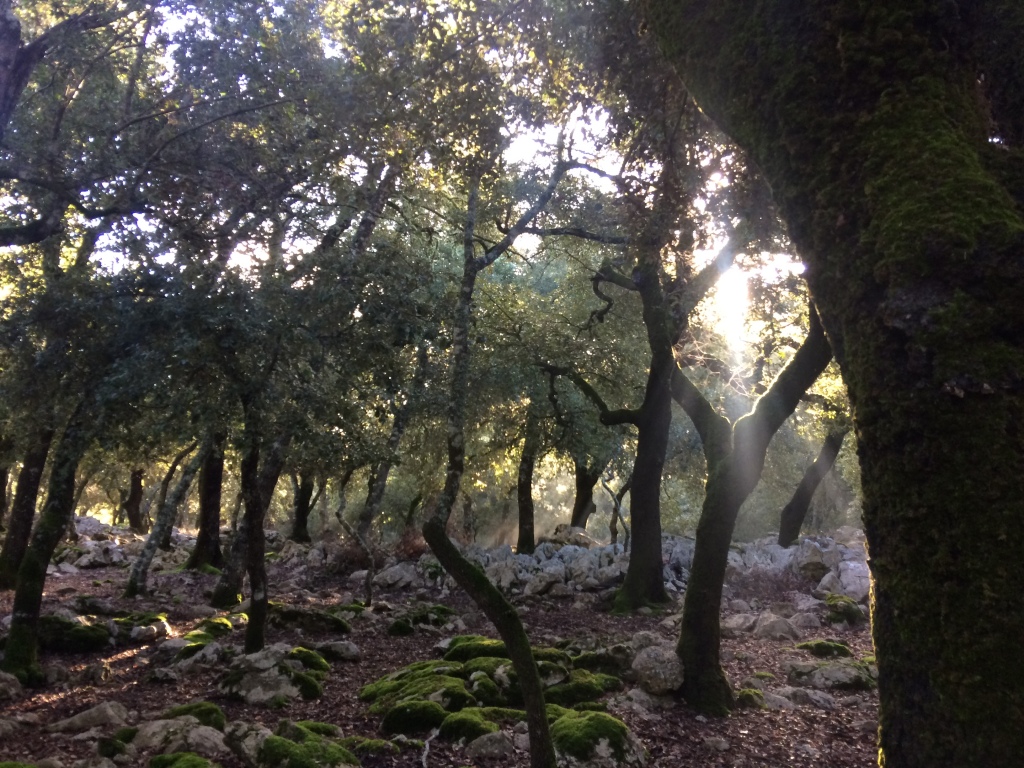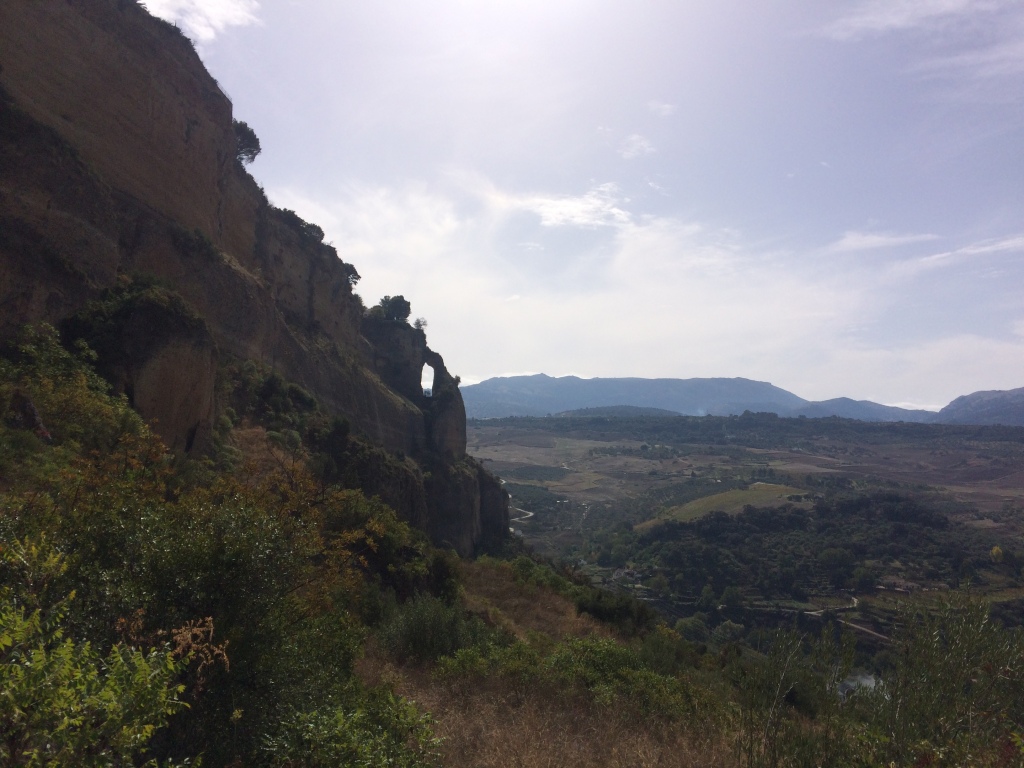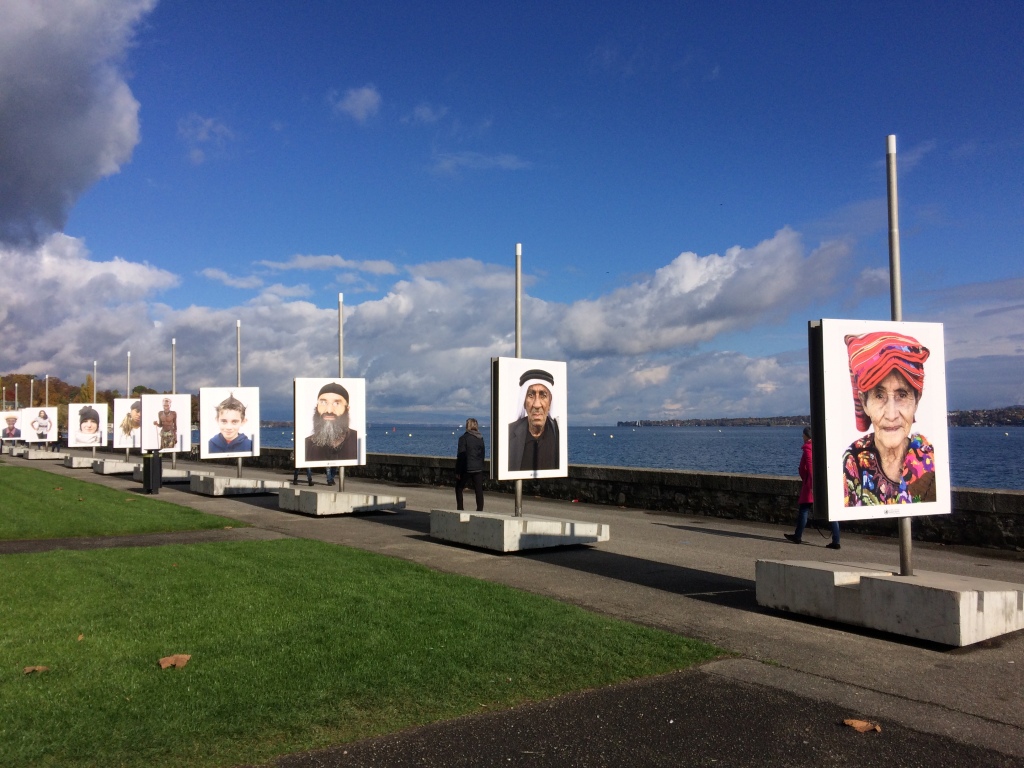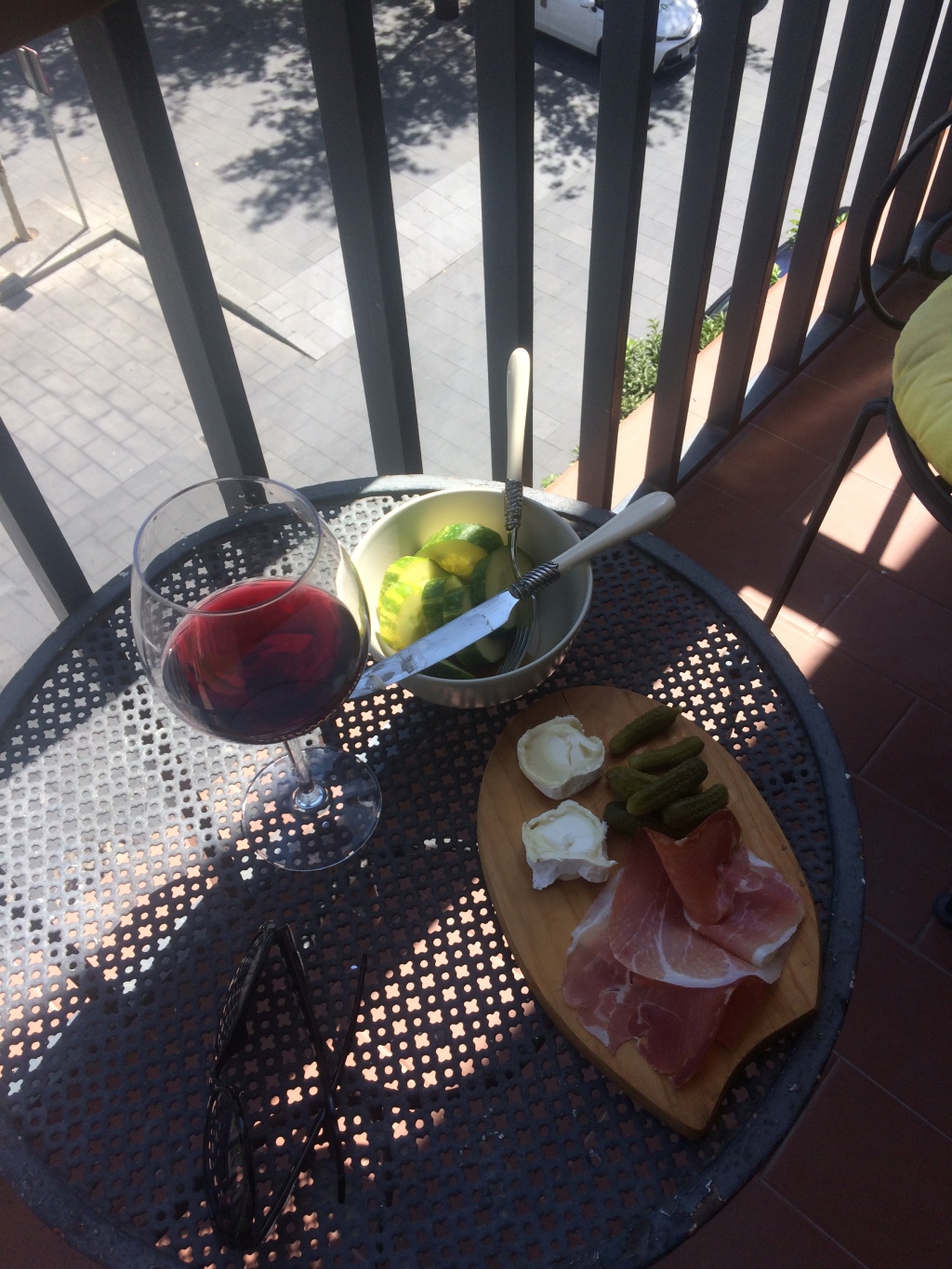I’m about at the halfway point of my time here in Spain. It’s hard to believe it; sometimes I feel like I arrived yesterday and other times I feel very settled. It’s the big things that make me feel like this isn’t home yet: realizing all the important November birthdays back in the States that I’m going to miss, thinking of how much my little sister must be growing up. It’s the little things that make me feel like this is home: how strange the title of this post looks to me in English with so many capital letters, realizing that now I know certain words primarily in Spanish (truque, patrimonio, puerro…words that have nothing to do with each other).
I turned 22 this month, and it was the second birthday I’ve spent abroad. The first one, my sixteenth, I spent with my Costa Rican family. We celebrated with a cake that had my name on it; it was chocolate and vanilla checkered inside, and I remember wondering how the baker had formed such perfect little cubes from the two different batters. Then I went with my host sisters, Monse and Jimena, and Monse’s daughter Alexa, to the Limon province, where we went to the beach, ate rice and beans, and I drank a tequila sunrise at an open-air reggae bar. It was wonderful.
I didn’t want to call attention to my 22nd birthday. 22 isn’t a big one, I’m no one’s kid here, and I couldn’t help but miss my family and the mountains. My birthday fell on a Sunday, and on Saturday I took a train to Madrid. I had found some bus-accessible hikes about an hour from the city and I needed a change of pace and some cooler air.
From the Madrid Atocha train station, I needed to take the Metro Line 1 to Plaza de Castilla, a big bus station. That should have been easy enough. Instead, part of the Line 1 was down, so I took another train to Chamartin and doubled back on the metro to Plaza de Castilla. From there, the 724 Bus took me to Manzanares el Real, where I briefly toured an anticlimactic castle, and then went to the tourism office and got a map to hike to La Pedriza.

Sierra de Guadarrama Mountains
I’m not good at following maps or directions of how to get anywhere, and I have zero intuition about where I am in space. I think I completed the La Pedriza hike by walking along a trail that began and ended with a parking lot at either end. Who really knows where I was though. It was beautiful, not particularly steep, with a narrow river running to one side and the Sierra de Guadarrama mountains rising around me. It was what I needed, but not everything I needed. It was beautiful and authentic; I didn’t see tour guides and there certainly weren’t buses to whisk you up to the pretty spots. But it had been a stressful week and I wanted the release of some sort of adrenaline. So on my way back, instead of sticking to the trail, I wandered off the trail to the rocky slopes beside it. Initially I was climbing between the rocks, heading steadily uphill. But I really wanted to climb on them.
Let’s make one thing clear. I am not a climber. I’ve been rock climbing with ropes and a harness once, with a friend who was a serious climber. It was awesome but I don’t know anything about doing it myself. Anyway, I was determined to scramble up onto these rocks somehow, and I did (more or less gracefully, probably less.) Close to the ridge line, there was a huge rock that I saw serious climbers making their way up the front of. They had gear and looked like they knew what they were doing. I approached it from the side, found a crevice at a point where the incline wasn’t so steep, and began climbing up. The crevice led me around to the front of the rock, where I knew I wouldn’t be able to go any further. But I had gone far enough. It was incredible. I spoke to one of the guys climbing who seemed mildly horrified to see me up there, barefoot with my shoes tied haphazardly onto my little backpack. He asked me why I didn’t have ropes. Without meaning to be sassy or sarcastic, I responded “because I don’t have ropes.” I assured him that I’d be able to get down just fine the way I came up, and I did (other than some scratches on my hands and forearms, and a rip right on the butt of my leggings).

Do you see the tiny spec at the left edge of the rock? That’s not me, but that’s where I was.
I got back to Madrid that night content and exhausted. I had plans to meet up with my cousin the next day, so I spent the night in the city and wandered around the next morning. I found an outdoor market near the train station selling pastries, jewelry, scarves, leather goods, and tables and tables of used books. I see used books all over the place here. There’s a coffee shop about ten minutes from my apartment called El Viajero Sedentario whose walls are lined with secondhand books for sale.
That afternoon I met up with my cousin Balthazar, who I hadn’t seen in six or more years, and a friend of his who lives in Madrid. We ate lunch and walked around the Parque del Retiro. We talked about hiking and work and school and politics, and I was (like I always am with Europeans) impressed by how well educated they both were about American politics. I remember playing with Balthazar when we were young kids and he spoke only French and I spoke only English; I remember later on when he spoke English perfectly but my mom wouldn’t let him speak it to me, so we spoke French. This time we spoke English, and I promised myself that once I get back to the States, I would improve my French. It was the best birthday weekend I could have asked for.
The following weekend I went on a guided tour to Morocco. Traveling to Morocco was one of the aspects of studying in Spain that I was most excited about. Not speaking French or Arabic, I thought a guided trip would be the best way to do it. And for my first time going there, I guess it was. But the truth is that I don’t enjoy big group activities and I hate guided tours (the notable and enormous exception being anything outdoors with a wilderness guide. I love that stuff, it’s enabled me to raft and hike and zip line in places I could never navigate alone, and I’ve loved the trekking guides I’ve had.) I’m not going to take you through all the bus-tour bullshit, the wasted time and waiting around, and the total lack of personal agency, but if I go a second time (which I hope someday I do) I’ll do it differently.
Frustration aside, Morocco was incredible and I’m so glad to have gone. My roommate there was a French girl named Ella. We communicated best in Spanish, and I promised myself again to work on my French as soon as I get home. After arriving to our hotel and eating dinner the first night, we went right outside the hotel gate to the beach. We put our toes in the Mediterranean and then walked down the shore. As we walked, two Moroccan guys about our age approached us and said something we didn’t understand. We offered the three languages that the two of us spoke combined, to no avail. One began to do something with his hands and my first thought was vulgar and horrifying. Oh God, it was so stupid of me to leave the hotel like this. What have we gotten ourselves into. I didn’t really think they would hurt us, but they were being so forward and inappropriate… and then all of a sudden I realized that wasn’t what they were doing at all; they were miming a wedding ring, to ask if we were married. Ella happened to be wearing a regular ring on her wedding finger, which they must have taken to mean yes, we are married women. It was funny and sweet; they shook our hands politely and left us to continue their walk. We started laughing and made our way back to the hotel, where we realized one of the guards had been standing at the gate and keeping an eye on us the whole time.
The next day, we went to Tangier. I have no idea if Tangier is nice or not because we stayed on the bus except for about an hour at the beach. It was not worth how far out of our way it was. Then we continued to Chefchaouen, the blue city. It’s nestled between two mountains, and after a tour that I resented, we had time to ourselves and I ended up walking up a path on the side of one of the mountains to the mirador: a lookout spot with a panoramic view of the mountains, the valley, and the blue and white buildings.

It was incredible and made me want to keep hiking. I thought of the trip my parents took to Morocco before I was born, where everyone thought my dad was Moroccan, my dad somehow thought people would understand him if he spoke English with a French accent, and someone offered my dad twenty camels in exchange for my mom. I hope that someday I have the opportunity to see rural Morocco, like they did. Yet again, I promised myself I’d work on my French.
The last day in Morocco was fun. We explored the market in Tetuan, my friend Allison taught me how to haggle, and I drank the tap water didn’t get sick. Like so many things here, this trip left me a little wiser, a little frustrated, and wanting more. I’m learning so much that I can’t quite articulate; about life and about travel and about myself. I’ve also learned some simple things that I really wish someone had told me beforehand, and that’s what I’ll leave you with.
International Driving Permit: This is a thing that you need to rent a car and drive in Spain. It doesn’t involve any class or test, it’s just something you pay for and get. The catch is that it’s simple to get in America from your local DMV, but a complicated mail-order process if you’re abroad. At this point, it’s not worth it to me to send away for one. But it’ll be high on my to-do list next time I go abroad.
Long Sleeves: Women wear them in Morocco. We were all wondering whether it would be respectful or whether it would seem like cultural appropriation to cover our heads. But long sleeves would have been so easy. Instead, we were told “you can wear whatever you want to Morocco! Be as Western as you want!” Legally, and even safety-wise, this seemed true. But just because you can do something doesn’t mean you should. I tried to dress in clothes that would both be as respectful as possible and prevent me from standing out. I opted for loose pants and shirts, and scarves. I think my intentions were good, but I don’t think I accomplished what I wanted. I would have if I had long sleeves.
Care Packages: Don’t even bother. I have two packages in holding at customs in Madrid right now. I went to the international office at school to ask for help, and they told me that customs is horrible, and a student last year spent an entire semester trying to get a package. It’s funny; Spain is pretty easy for people to get in and out of, and I’ve gotten regular mail without a problem, but apparently they draw the line at a box full of candy and magazines. I’m giving up on my stuff and grateful that there’s nothing big or essential in either package.
Languages: If you have the chance, learn them. I wish I hadn’t been such a brat when my mom tried to teach me French as a kid. I should have soaked it up. Instead, I’m going to get the Duolingo app when I get home and hope for some level of functional spoken French.
I’m not going to try to impart any big, symbolic life lessons. I’m not sure I’ll ever fully grasp those. But I will say this: a lot of aspects of this trip have been different than I’ve expected. Not better or worse, just different. Being out of my comfort zone has given me a lot of perspective on my own life, and I’m grateful for that. I’m also grateful for the little things in a way that I often overlook: I’m grateful for the bus that travels between Madrid and the mountains, I’m grateful to have spent an afternoon with a cousin, and I’m grateful to have seen kids grinning and jumping on a narrow, bright blue stairway on the side of a building. 


















 I like bus stations. I like train stations. I like airports. They stand at the threshold of something, somewhere in between coming and going. They’re the link between wherever you are and the rest of the world. And wherever I am, I always end up restless. Don’t get me wrong; I love Sevilla. I love the cobblestones and the wine and the orange trees. But I crave the act of travel itself, not just the destination. This morning, on a train to Málaga, I was reading On the Road. “We were leaving confusion and nonsense behind and performing our one and noble function of the time, move.” The “purity of the road” that Kerouac describes so perfectly has been a constant for me no matter what else is going on. Here, thousands of miles from home, one of my deepest comforts is travel itself.
I like bus stations. I like train stations. I like airports. They stand at the threshold of something, somewhere in between coming and going. They’re the link between wherever you are and the rest of the world. And wherever I am, I always end up restless. Don’t get me wrong; I love Sevilla. I love the cobblestones and the wine and the orange trees. But I crave the act of travel itself, not just the destination. This morning, on a train to Málaga, I was reading On the Road. “We were leaving confusion and nonsense behind and performing our one and noble function of the time, move.” The “purity of the road” that Kerouac describes so perfectly has been a constant for me no matter what else is going on. Here, thousands of miles from home, one of my deepest comforts is travel itself.
 After a nap, I explored the cliffs above the beach and again had my breath taken away by how rugged and beautiful it was. I’m happy to have pictures, but they don’t come close to doing this trip justice. Even more than than the cool clarity of the water, the warmth of the sun, and the softness of the sand, I’m grateful for the vitality of the adrenaline from climbing and jumping, and for the rejuvination this trip provided me. It was staggering, beautiful, and great in a way that I don’t think a man-made structure will ever be. Being here made me feel both very small and very whole.
After a nap, I explored the cliffs above the beach and again had my breath taken away by how rugged and beautiful it was. I’m happy to have pictures, but they don’t come close to doing this trip justice. Even more than than the cool clarity of the water, the warmth of the sun, and the softness of the sand, I’m grateful for the vitality of the adrenaline from climbing and jumping, and for the rejuvination this trip provided me. It was staggering, beautiful, and great in a way that I don’t think a man-made structure will ever be. Being here made me feel both very small and very whole. The walk itself was stunning. On one side, the mountain rose straight up and down. On the other, water smooth and bright like polished jade snaked through the gorge. It was an easy trek, 7 or 8 km and pretty flat. As I took it in I imagined what it must have been like before the 21st century safety standards were implemented. I thought about what those mountains would be like for serious climbers. I thought about myself and my cousin hiking the Inca Trail ten months ago, which was neither as dangerous as this would have been pre-renovations, nor nearly as safe as it is now. I wished this were slightly less accessible, so I could have felt like I earned the views and the altitude.
The walk itself was stunning. On one side, the mountain rose straight up and down. On the other, water smooth and bright like polished jade snaked through the gorge. It was an easy trek, 7 or 8 km and pretty flat. As I took it in I imagined what it must have been like before the 21st century safety standards were implemented. I thought about what those mountains would be like for serious climbers. I thought about myself and my cousin hiking the Inca Trail ten months ago, which was neither as dangerous as this would have been pre-renovations, nor nearly as safe as it is now. I wished this were slightly less accessible, so I could have felt like I earned the views and the altitude.





